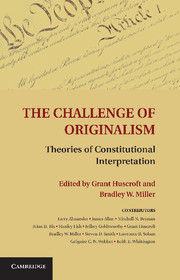Book contents
- Frontmatter
- Contents
- Preface
- Contributors
- The Challenge of Originalism: Theories of Constitutional Interpretation
- Part One Exposition and Defense
- Part Two Interpretation and Intention
- Part Three Originalism and Constitutional Settlement
- Part Four Challenges and Critiques
- 10 That Old-Time Originalism
- 11 Reflective Equilibrium and Constitutional Method: Lessons from John McCain and the Natural-Born Citizenship Clause
- 12 Constitutions, Originalism, and Meaning
- Index
- References
11 - Reflective Equilibrium and Constitutional Method: Lessons from John McCain and the Natural-Born Citizenship Clause
from Part Four - Challenges and Critiques
Published online by Cambridge University Press: 07 October 2011
- Frontmatter
- Contents
- Preface
- Contributors
- The Challenge of Originalism: Theories of Constitutional Interpretation
- Part One Exposition and Defense
- Part Two Interpretation and Intention
- Part Three Originalism and Constitutional Settlement
- Part Four Challenges and Critiques
- 10 That Old-Time Originalism
- 11 Reflective Equilibrium and Constitutional Method: Lessons from John McCain and the Natural-Born Citizenship Clause
- 12 Constitutions, Originalism, and Meaning
- Index
- References
Summary
Introduction
Partisans to the debate over originalism press their respective positions on diverse grounds. Originalists variously argue, for example, that fidelity to the original meaning of the constitutional text (or to certain intentions of framers or ratifiers) is demanded by proper respect for the rule of law, or follows from the correct understanding of the nature and objective of interpretation generally, or best promotes values like stability, predictability, and democratic accountability. Their opponents challenge these claims and argue further that a commitment to originalism is unworkable, produces bad or unjust results, or furnishes insidious cover for the naked policy choices of its proponents.
Yet as varied as these (and other) argumentative strategies are, they do not exhaust the set of plausible ways to argue for or against a theory of constitutional interpretation. In particular, it might be possible to argue productively about candidate theories of constitutional interpretation by assigning a more prominent role than is customary to purportedly shared convictions about the proper legal resolution of particular cases. In this essay, I aim to explore that possibility by adapting the Rawlsian method of reflective equilibrium to the constitutional domain and by focusing, as a case study, on the specific question of whether Senator John McCain is constitutionally eligible to serve as president of the United States, consistent with the natural-born citizenship clause of the United States Constitution, which provides that “[n]o person except a natural born Citizen…shall be eligible to the Office of President.”
- Type
- Chapter
- Information
- The Challenge of OriginalismTheories of Constitutional Interpretation, pp. 246 - 284Publisher: Cambridge University PressPrint publication year: 2011
References
- 1
- Cited by



